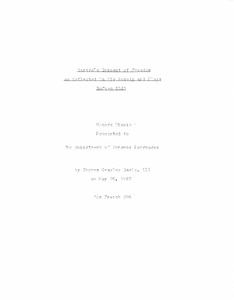| dc.rights.license | In Copyright | en_US |
| dc.creator | Davis, Thomas Crawley | |
| dc.date.accessioned | 2023-10-20T17:40:53Z | |
| dc.date.available | 2023-10-20T17:40:53Z | |
| dc.date.created | 1967 | |
| dc.identifier | WLURG038_Davis_thesis_1967 | |
| dc.identifier.uri | https://dspace.wlu.edu/handle/11021/36409 | |
| dc.description.abstract | Sartre thinks of freedom not as something man has, but as something man is. He says: Man is his freedom; thus, man is condemned to be free. This study attempts to sound the depths of that statement.
Freedom is the major theme which links the works to be examined in this study. Subsidiary themes such as bad faith and the problem of engagement sometimes deserve special attention, but the concept of freedom itself is the focal point of the entire examination. In Sartre's novels and plays written before 1949 there is an evident evolution in his expression of the concept of freedom. His early works emphasize the awareness of the contingency of existence which reveals one's freedom. Later works concentrate on various individual reactions to that awareness, especially on attempts to evade it. The authentic commitment of one's freedom is the subject of the final works. This gradual development of the concept of freedom shall be made explicit in the following study. Numerous philosophers have described the nature of human existence and interpersonal relationships in highly technical terms, but few philosophers have been able to apply their theories to familiar human situations. In other words, few philosophers have been able to make their theories "come to life." Sartre, however, is an exception to that observation. In fact, Sartre is often more skillful in applying theory than he is in fomulating it; he is an outstanding playwright, a good novelist, but is considered by many to be only a mediocre philosopher. To appreciate fully the complex ideas which Sartre expresses in Being and Nothingness, one should examine Sartre's literary works, particularly his novels and plays. Chapter One of this study deals with the concept of freedom as is explained in Being and Nothingness. Chapter Two shows how this concept is employed in Sartre's novels, and Chapter Three how it is used in his plays. [From Introduction] | en_US |
| dc.format.extent | 73 pages | en_US |
| dc.language.iso | en_US | en_US |
| dc.rights | This material is made available for use in research, teaching, and private study, pursuant to U.S. Copyright law. The user assumes full responsibility for any use of the materials, including but not limited to, infringement of copyright and publication rights of reproduced materials. Any materials used should be fully credited with the source. | en_US |
| dc.rights.uri | http://rightsstatements.org/vocab/InC/1.0/ | en_US |
| dc.title | Sartre's Concept of Freedom as Reflected in his Novel and Plays before 1949 | en_US |
| dc.type | Text | en_US |
| dcterms.isPartOf | WLURG038 - Student Papers | en_US |
| dc.rights.holder | Davis, Thomas Crawley | en_US |
| dc.subject.fast | Sartre, Jean-Paul, 1905-1980 | en_US |
| dc.subject.fast | Existentialism in literature | en_US |
| dc.subject.fast | Authenticity (Philosophy) | en_US |
